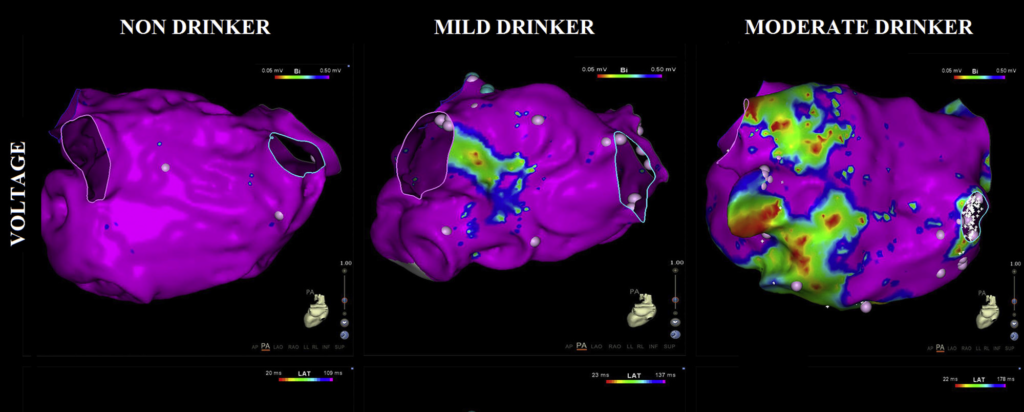
Over the last few years, several new studies have been conducted concerning the link between alcohol and atrial fibrillation. There has been agreement for many years that there is a link between high alcohol consumption and a patient’s risk of developing atrial fibrillation. Regular ingestion of large quantities of alcohol increases the risk of atrial fibrillation. There is also consensus that alcohol consumption, both daily drinking and binge-drinking, increases the risk of triggering an attack of atrial fibrillation in patients who have previously suffered with it.
Research on the connection between the level of consumption of alcohol and atrial Fibrillation
While it is agreed that significant alcohol consumption increases the risks of developing atrial fibrillation, the consensus breaks down when we look at moderate alcohol consumption.
In order to understand this challenge, a group of Swedish researchers have studied a large sample of Swedish men and women. At the same time, they made an overall analysis of previous studies on this topic.
Their results demonstrated that for every increase in daily alcohol intake, measured as a normal strength beer or glass of wine, the risk of developing atrial fibrillation increases by 8%. This means that if you consume 21 drinks per week, or around 3 glasses of beer/wine a day, you increase your risk of atrial fibrillation by 25%, and thus your general lifetime risk of developing AF by 35%!
This study has been corrected for differences in age, gender, and other factors that could bias the outcome. The results of the study were confirmed by analyzing a large number of previous studies which had looked at the link between atrial fibrillation and moderate alcohol consumption.
This leaves little doubt that even moderate alcohol consumption gives a certain increased risk of atrial fibrillation. It is presumably an interplay of different alcohol that can increase a patient’s risk of developing atrial fibrillation.
Study on changes in the heart’s impulse conduction due to alcohol
Another study was conducted by an Australian research team that looked at the changes in the heart’s impulse conduction using information on alcohol consumption obtained from trial participants. They found that disturbances in the pulse propagation could be detected in the atria of the heart, which were more common the higher the average alcohol consumption.
This connection also applied to moderate alcohol consumption, on average around 2-3 drinks per day, or 14-21 drinks per week. The disturbances that the researchers detected were of the kind that we usually associate with the onset of atrial fibrillation. It should be noted that individuals with light alcohol consumption, a maximum of one drink per day and less than 7 drinks per week, compared to those who abstained from alcohol completely.

In the picture above, the red / yellow / green areas are places where the impulse line is disturbed. The three images represent the left atrium of a person who never touches alcohol (non-drinker), a person with alcohol consumption below 7 drinks per week (mild drinker) and a person with alcohol consumption of 7-21 drinks per week (moderate drinker), respectively. These are patterns that I also see myself when I perform ablation treatment for atrial fibrillation.
I interpret these results – both from the Swedish and from the Australian researchers – in such a way that I would not advise against enjoying a glass of wine or two on the weekend, perhaps even on both Friday and Saturday. However, one should avoid alcohol on a daily basis and avoid drinking larger amounts of alcohol at all.